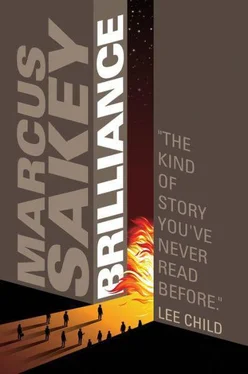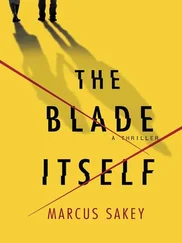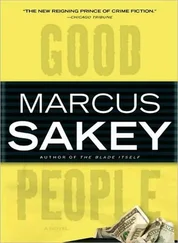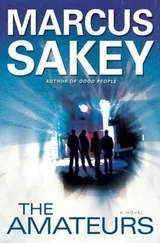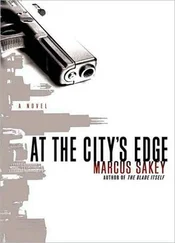“Hey,” Cooper said. “What’s your name?”
“I need a doctor, man, I need a doctor bad.”
“We’ll get you a doctor soon. I promise. What’s your name?”
“Gary Nie—”
“Don’t tell them nothing ,” Dusty Evans said from the backseat. “This is Gestapo bullshit. This is what we’re fighting against.”
“Listen, Gary,” Cooper said, ignoring the outburst, “we don’t have a lot of time.” The back of a semi loomed, brake lights flaring as the trucker tried to pull over, but Cooper was going too fast, had to skim between the lanes, the left mirror inches from the concrete barrier, the right almost touching the truck panels. He was good at driving fast, enjoyed the dance of hurtling steel, but the circumstances were making it tricky, the chaos of sirens and lights and horns and screams and blood, not to mention the stakes, a vision of what he feared was about to happen. “I need you to answer some questions. First, where exactly is the bomb?”
“How do you know about the—”
“Don’t say anything, you hear?” Evans again. “You hear me?”
There was the snick of metal against leather. Cooper spared a quarter second to glance in the rearview. Evans had turned into a statue, his eyes rolling but muscles locked. Bobby Quinn didn’t look away from the pistol he held to the man’s temple. “Go ahead, Coop. I think the backseat is out of opinions.”
“Thank you.” Cooper put on his best mild grin. “Now. We know you planted the bomb.” They hadn’t, of course, until Gary confirmed it a moment ago, but there was no point saying that. He pulled past a sedan, saw a patch of blessedly empty straightaway and floored it. “These are the things I need to know. Where exactly is it? What kind of bomb? How powerful? How is it detonated? When?”
Gary moaned and rocked forward, his hands clenched over his left thigh. The backs of his hands were caked in dried blood. His features were pale. “Jesusgod this hurts. I need a doctor.”
“Elevate it.”
The man looked at him, and Cooper nodded. “Go ahead.”
Gary fumbled to undo his seatbelt, then spun so that he was leaning against the side door. He raised the leg awkwardly, bracing a boot against the console and moaning as he did.
“Better? Good. Now listen. Where exactly is the bomb? What kind is it? How powerful? How is it detonated? When?”
“I don’t.” He gasped as the Escalade hit a pothole at 112 miles an hour, bouncing on the heavy shocks as they blew past a tour bus. “Goddamn it! Take me to a hospital.”
Cooper glanced over. Gary Nie-whatever’s long hair was scraggly and matted with sweat. His body was broadcasting agony, all of his muscles tensed, and trying to read the subtleties beneath that was dicey at best. One thing was for sure, though, the man looked smaller when he wasn’t holding a shotgun.
Slowly and carefully, he asked again. “Where is the bomb? What kind is it? How powerful? How is it detonated? When?”
Gary looked over, his eyes glossy with tears. His lips quivered, and then he whispered something.
“What?”
“I said.” The man fought a breath in. “Screw you, Gas Man. I am John Smith.”
The road was two lanes of blacktop in each direction under steel-gray skies. Half a mile ahead a bridge stretched across the listless brown of the Passaic River. Cooper checked the side mirror. Clear.
He leaned across Gary Nie-whatever’s chest and yanked the door handle at the same time as he jerked the steering wheel left. Centripetal force and the weight of the man’s body threw the door open.
For a fraction of a second, Gary hung weightless as a balloon, his mouth open, arms in front of him, the chain of the handcuffs still swinging between them as a roar of wind filled the world.
Then Cooper jerked the wheel to the right, narrowly dodging the lane divider. The door slammed shut. In the rearview mirror Gary’s body hit the pavement at a hundred miles an hour, smearing and bouncing. There was a squeal of air brakes as the tour bus behind them fought to stop, and then his body vanished beneath its wheels.
Quinn said, “Jesus Christ! Cooper—”
“Shut up.” Cooper looked in the rearview. Dusty Evans had both hands to his mouth, the muscles of his throat twitching. His eyes stared, unbelieving. Cooper waited until he turned back to the front, locked gazes. “Now. Where exactly is the bomb? What kind is it? How powerful? How is it detonated? When?”
In a very real sense, the south end of Manhattan is the center of the universe. The concrete canyons of Broad and Wall, of Nassau and Exchange and Maiden, have for a century served as the financial epicenter of the world. The largest of the Federal Reserve Banks is located there. AIG, Morgan Stanley, Deloitte, Merrill Lynch. And until abnorms like Erik Epstein forced the government to shut it down, $153 billion flowed through the New York Stock Exchange every single day.
It is a landscape of marble and glass, of cobblestone streets thronged with tourists and traders, of the rumble of delivery trucks on Broadway and blasts of warm air from the subway, of enormous American flags and somber statues. During the workday the population swells 600 percent. Under the very best of circumstances, it is not easy to navigate quickly.
Cooper was not finding today to be the best of circumstances.
The new Leon Walras Exchange was located in the grand old building that used to house the NYSE. Though popular opinion focused on Erik Epstein, the twenty-four-year-old billionaire had in truth been only the most successful of a number of abnorms whose gifts broke the global financial system. For two hundred years, the market had existed on the myth that all people were equal. It was a nonsensical statement, but an easy one for most people to swallow when the prospect of financial gain was involved.
It was a myth that couldn’t survive the gifted. Epstein and others like him had pillaged the market with as much ease as Cooper could have dodged a slap.
Two years ago, the United States had bowed to the inevitable and dissolved the stock market. It was a nuclear option, and while it had worked, the side effects were disastrous. Without the free market to support it, American industry had to pay for itself—and found it often couldn’t. Small-cap companies became endangered species. Entrepreneurship plummeted. Protests on Wall Street raged to this day. Meanwhile, fortunes were wiped away, and the grandmother who stored cash in her mattress suddenly had the right savings plan.
If it was to survive, America had to develop a new system of exchange, one which would be impervious to the games-manship of gifted individuals. By functioning as an auction house and averaging the bids to arrive at a final price, the Leon Walras Exchange had in one stroke stripped out the volatility, excitement, and emotion of investing, while still offering the potential for businesses to raise capital. It was a step backward to a more archaic age that had taken two painful years to move through the political process.
And today, March 12, 2013, at 2:00 p.m. General Electric would become the first public offering of the new financial reality. At 2:00 p.m., history would be made.
Which meant that now, at 1:51 p.m., lower Manhattan was a nightmare. Wall Street had been cordoned off for blocks in each direction. Foot police redirected traffic on Broadway, blowing whistles and gesturing impatiently. Half a dozen school buses had been parked along Liberty, and harried teachers fought to corral children hyped up on the excitement of an afternoon out of class. A line of protesters shoved against a police barricade, raising placards and shouting slogans. A marching band played in Trinity Churchyard, the brass mostly lost in the noise but the bass thumping uneasily through every stomach. Media helicopters circled above. Bobby Quinn’s datapad showed a live feed of a podium on the steps where the former CEO of the NYSE chatted with the new CEO of the LWE and the first deputy mayor of New York, the three of them surrounded by men in dark suits and sunglasses.
Читать дальше
